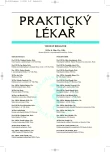-
Medical journals
- Career
Use of CT for risk stratification and diagnosis of ischemic heart disease
Authors: P. Toušek; J. Knot
Authors‘ workplace: Přednosta: prof. MUDr. Petr Widimský, DrSc. ; III. interní-kardiologická klinika ; 3. lékařská fakulta ; Fakultní nemocnice Královské Vinohrady, Praha ; Univerzita Karlova v Praze
Published in: Prakt. Lék. 2008; 88(8): 442-445
Category: Reviews
Overview
Coronary artery disease is the leading cause of mortality and morbidity in the developed world in the 21st century. Therefore, prevention and early disease diagnosis is very important for patients at risk from or with suspected CAD. Examination with computer tomography using modern imaging techniques is currently increasing in this field. The probability of CAD and long-term patient prognosis can be assessed by coronary artery calcium scoring. Following intravenous contrast administration, coronary arteries can be visualized and severe coronary stenosis can be thus excluded. However, this examination is not an alternative to conventional invasive coronary angiography. This review article is focused on the current role of CT in evaluation of patients with known or suspected CAD.
Key words:
computer tomography, calcium scoring, CT contrast angiography.
Sources
1. Budoff, M.J., Cohen, M.C., Garcia, M.J. et al. ACCF/AHA Clinical competence statement on cardiac imaging with computed tomography and magnetic resonance. J. Am. Coll. Cardiol. 2005, 46, p. 383-402.
2. Greenland, P., Bonow, R.O., Brundage, B.H. et al. ACCF/AHA 2007 Clinical Expert consensus document on coronary artery calcium scoring by computed tomography in global risk assessment and in evaluation of patiens with chest pain. J. Am. Coll. Cardiol. 2007, 49, p. 378-402.
3. Fox, K., Garcia, K.M., Ardissino, D. et al. Guidelines on the management of stable angina pectoris: executive summary: the Task Force on the Management of Stable Angina Pectoris of the European Society of Cardiology. Eur. Heart J. 2006, 27, 11 p. 1341-1381.
4. DeFeyter, P.J., Meijboom, W.B., Weustink, A. et al. Spiral multislice computed tomography coronary angiography: a current status report. Clin. Cardiol. 2007; 30 , p. 437-442.
5. Min, J. Radiological Society of North America 2007; November 25-30, 2007; Chicago, Ilinois, USA
6. Knot, J., Tousek, P., Petr, R., Widimsky, P. Assessment of coronary artery calcium in different types of qualitative coronary angiograms. 7th Congress of Coronary artery disease, Venice, Italy, October 2007.
7. Cífková, R., Rosolová, H., Češka, R. a kol. Prevence kardiovaskulárních onemocnění v dospělém věku. Společné doporučení českých odborných společností. Dostupné na http://www.kardio-cz.cz/index.php?&desktop=clanky&action=view&id=261.
8. Šochman, J., Vedlis, D., Peregrin, J. Význam koronárního kalciového skóre ve spektru vyšetřovacích metod. Prakt. lék., 2006, 86, 12, s. 714-717.
9. Sovová, E., Kamínek, M., Horák, D. et al. Stanovení kalciového skóre pomocí výpočetní tomografie (CT) v kombinaci se zátěžovým SPECT zobrazením myokardiální perfúze. Prakt. lék., 2007, 87, 9, s. 554-558.
Labels
General practitioner for children and adolescents General practitioner for adults
Article was published inGeneral Practitioner

2008 Issue 8-
All articles in this issue
- Acute exacerbation of chronic obstructive pulmonary disease as seen by the intensivist
- Use of CT for risk stratification and diagnosis of ischemic heart disease
- The use of the fytosterols and omega 3 fatty acids in primary and secondary cardiovascular prevention
- Occupational diseases due to asbestos dust – do we take them into account?
- Chronic damage of the triangular fibrocartilage complex
- Acute facial palsy – a comparison of clinical and laboratory parameters in patients with Borrelia and idiopathic aetiology
- Pancreatic cancer II.
- Gastrotoxicity of non-steroidal anti-inflammatory drugs and their prescription in Slovakia
- Stenosis of the left subclavian artery as a cause of angina pectoris progression after CABG: coronary-subclavian steal syndrome
- Liver abscess in asymptomatic perforating diverticulitis resembling malignant liver tumour
- Angioscopy and intimomedial hyperplasia
- General Practitioner
- Journal archive
- Current issue
- Online only
- About the journal
Most read in this issue- Chronic damage of the triangular fibrocartilage complex
- Acute facial palsy – a comparison of clinical and laboratory parameters in patients with Borrelia and idiopathic aetiology
- Stenosis of the left subclavian artery as a cause of angina pectoris progression after CABG: coronary-subclavian steal syndrome
- Acute exacerbation of chronic obstructive pulmonary disease as seen by the intensivist
Login#ADS_BOTTOM_SCRIPTS#Forgotten passwordEnter the email address that you registered with. We will send you instructions on how to set a new password.
- Career

